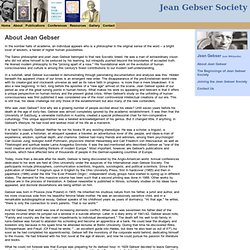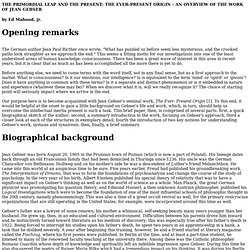

Jean Gebser. In the somber halls of academe, an individual appears who is a philosopher in the original sense of the word -- a bright lover of wisdom, a herald of higher human possibilities.

The Swiss philosopher and poet Jean Gebser belonged to that rare Socratic breed. He was a man of extraordinary vision who did not allow himself to be seduced by his learning, but intrepidly pushed beyond the boundaries of accepted truth. He likened modern philosophy to the "picking apart of a rose. " His foundational work on the evolution of human consciousness and culture is among this century's finest contributions to our modern self-understanding. In a nutshell, what Gebser succeeded in demonstrating through painstaking documentation and analysis was this: Hidden beneath the apparent chaos of our times is an emergent new order. Who was Jean Gebser? It is hard to classify Gebser. Today, more than a decade after his death, Gebser is being discovered by the Anglo-American world.
AN OVERVIEW OF THE WORK OF JEAN GEBSER. By Ed Mahood, jr.

The German author Jean Paul Ricther once wrote, "What has puzzled us before seem less mysterious, and the crooked paths look straighter as we approach the end. " This seems a fitting motto for our investigations into one of the least understood areas of human knowledge: consciousness. There has been a great wave of interest in this area in recent years, but it is clear that as much as has been accomplished all the more there is yet to do. Before anything else, we need to come terms with the word itself, not in any final sense, but as a first approach to the matter. What is consciousness? Our purpose here is to become acquainted with Jean Gebser's seminal work, The Ever- Present Origin [1]. Jean Gebser was born August 20, 1905 in the Prussian town of Poznan (which is now a part of Poland). Gebser's father was a lawyer of some renown; his mother a whimsical, self-seeking beauty many years younger than her husband.
The Archaic structure of consciousness. Jean Gebser. Jean Gebser (German: [ˈɡeːpsɐ]; August 20, 1905 – May 14, 1973) was a philosopher, a linguist, and a poet, who described the structures of human consciousness.

Biography[edit] Born Hans Gebser in Posen in Imperial Germany (now Poland), he left Germany in 1929, living for a time in Italy and then in France. He then moved to Spain, mastered the Spanish language in a few months and entered the Spanish Civil Service where he rose to become a senior official in the Spanish Ministry of Education. When the Spanish Civil War began, he moved to Paris. [web 1] He lived in Paris for a while but saw the unavoidability of German invasion. Late in life, Gebser travelled widely in India, the Far East, and the Americas, and wrote half a dozen more books. Gebser died in Wabern bei Bern on May 14, 1973 "with a soft and knowing smile. " Jean Gebser & Integral Philosophy.